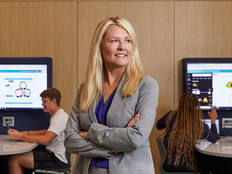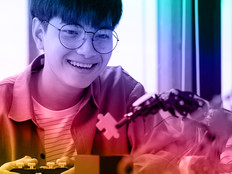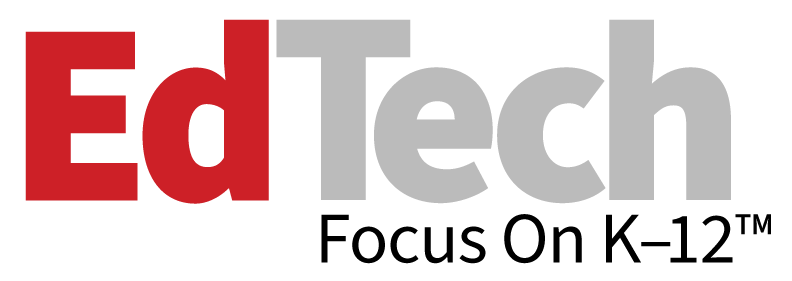Mission Possible
Smartphones, social networking and other Web 2.0 innovations are more than just diversions for today's young people. They are fundamentally changing the way students of all ages collaborate, communicate, participate and learn in the 21st century.
A one-hour PBS documentary premiering Sunday, Feb. 13, takes viewers “to the front lines” of this education revolution. Produced by tpt National Productions and Mobile Digital Arts, Digital Media: New Learners of the 21st Century shares the stories of five U.S. schools and institutions where digital media and mobile devices have transformed how educators teach and how students learn – both inside and outside the classroom.
“In the 20th century, we taught our kids what to learn,” the film explains. “We lined their desks up in rows and put the teacher at the front of the classroom. But in today's world, many educators are questioning the status quo by meeting young people where they are. They're using 21st century tools to help prepare kids for a 21st century world.”
To understand how modern technologies are reshaping education, filmmakers interviewed dozens of thought leaders, practitioners and students from around the country. Featured success stories include:
- YOUmedia, a teen learning center housed at the Chicago Public Library's Harold Washington Library Center that gives young people access to thousands of books, more than 100 desktop and notebook computers, and media creation tools. Mentors from the city's Digital Youth Network, as well as local librarians, conduct workshops at the center to help students develop their digital media skills by creating songs, videos, photos, blogs and other digital artifacts.
- The Science Leadership Academy (SLA) in Philadelphia, a partnership high school of the School District of Philadelphia and The Franklin Institute that focuses on inquiry-driven, project-based curricula and 21st century learning. At SLA, the core values of inquiry, research, collaboration, presentation and reflection are emphasized in all classes, and students regularly use technology to complete assignments.
- The Mobile Learning Institute at the Smithsonian, a summer program through which Washington, D.C.-area students visit various Smithsonian Institution museums and use smartphones to create a text message–based scavenger hunt for other students to play.
Through these stories and others, PBS says, Digital Media: New Learners of the 21st Century “explores how exceptional instructors are increasingly using digital media and interactive practices to ignite their students' curiosity and ingenuity, help them become civically engaged, allow them to collaborate with peers worldwide and empower them to direct their own learning.”
Sneaking a Peek
Several of the industry experts and practitioners featured in Digital Media gathered on Tuesday, Feb. 8, for a premiere event at the Hirshhorn Museum and Sculpture Garden in Washington, D.C. Hosted by PBS, the John D. & Catherine T. MacArthur Foundation and the Pearson Foundation, the invitation-only event included a keynote speech by Karen Cator, director of the U.S Department of Education's Office of Educational Technology.
In her remarks, Cator praised the documentary for shining “a bright light on how people learn in the 21st century. We don't know what we're training students for or what they'll be doing,” she said of the new instructional methods and tools teachers are using to engage students, “but we have an incredible opportunity here.” The challenge, she added, is educating everyone about digital media's legitimacy and value in the classroom. “We need more people to say, 'I get it. I see what this means' for education,” she said.
Other featured speakers included Paula Kerger, president and CEO of PBS; Connie Yowell, director of education for the MacArthur Foundation's U.S. Programs department; Mark Nieker, president and CEO of the Pearson Foundation; Richard Koshalek, director of the Hirshhorn; and filmmaker Stephen Brown, president of Mobile Digital Arts.
Following the screening of three real-life stories from the film, Nieker and Yowell hosted a panel discussion with Chris Lehmann, principal of the Science Leadership Academy; Stephanie Norby, executive director of the Smithsonian Center for Education and Museum Studies; and Nichole Pinkard, founder of the Digital Youth Network. “People have figured this out,” Nieker said of these institutions' successful integration of digital media and 21st century technologies – smartphones, netbooks, editing tools and the like – into the curriculum. “It's actually happening now.”
All of the panelists agreed that technology plays a central role in education today, but they warned that its use must not be haphazard. “The technology has to be ubiquitous, necessary and invisible,” Lehmann said.
Check local listings to see when Digital Media will air on your local PBS station.
“If we teach today's students as we did yesterday's, we are robbing them of tomorrow.”
– John Dewey, American philosopher and advocate for education reform








